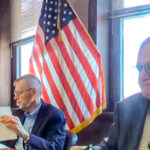Valentine’s Day brightens the long, cold winter. Women dream of roses, jewelry and romantic candlelit dinners. Woe betide the husband or sweetheart who forgets his wife or girlfriend (hopefully he doesn’t have both.)
Florists deliver bouquets to office desks and I once worked where one secretary received over a dozen bouquets, all from different gentlemen, and she got more at home. You can imagine the interest and speculation that caused. People passing my office door told me, “She’s got another one!” I doubt much work got done that day.
Valentine’s Day is named after two Christian saints in the early days of the Catholic Church. Fast forward to the 19th century, and hand-drawn and written cards were exchanged between sweethearts and special friends. In the early 20th century, commercial cards with lace trims and sentimental greetings were sent, destined to become family keepsakes.
Do you have any of those sweet Valentine Day cards or love letters of your ancestors? I have a card my Mom sent my Dad while he was in the Army in World War II and a couple of letters they exchanged during the war. The letters tell me of the hopes they had for their future together and I can tell my mother worried my father would be sent overseas into the battlefields.
If you have these kind of keepsakes, what have you decided will be their ultimate fate? Our local historical society was once given a lovely wedding gown, photos and a box of letters exchanged between an engaged couple. I helped catalog them and the president of the historical society and I enjoyed the letters and the joy they revealed of those long-ago lovers. One of our volunteers, however was horrified, and said she was going to destroy all her letters immediately. I tried to talk her out of that but doubt I was successful.
Intimate letters, notes, cards and other keepsakes are part of your family’s genealogical record, and the choice as to whether you will pass them on to descendants is yours, of course. If you destroy them, you destroy part of your family history, but many people have done that, feeling it’s an invasion of privacy to keep them. Queen Victoria had her youngest daughter, Princess Beatrice, burn many of the Queen’s letters to family members after her death. No one knows what secrets they held. The Queen kept a journal but historians yearn for the lost letters.
While the dead have no legal right to privacy, you may feel they have a moral right to it. As a historian, I hate to see the records erased. I also feel if people wanted letters destroyed they most likely would have done it themselves or asked someone to do for them.
So, on Valentine’s Day, reread those tokens from the past and rejoice in the happiness they brought to folks long gone. As their guardian I encourage you to let them live as tokens and memories of a special time in the lives of two people.
Columnist Nancy Battick of Dover-Foxcroft has researched genealogy for over 30 years. She is past president of the Maine Genealogical Society, author of several genealogical articles and co-transcribed the Vital Records of Dover-Foxcroft. Nancy holds an MA in History from UM and lives in DF with her husband, Jack, another avid genealogist. Reader emails are welcome at nbattick@roadrunner.com.




